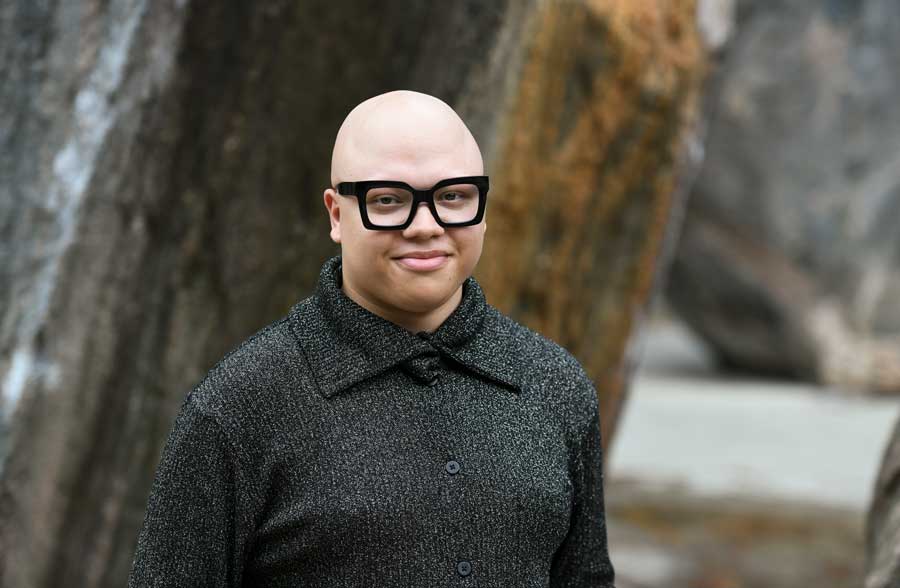PARTNER CONTENT

Alopecia areata
Alopecia areata is an autoimmune disease where the immune system’s T cells attack hair follicles, causing hair loss, often starting when people are in their teens, 20s or 30s.1 Although it doesn’t generally cause other symptoms, alopecia is often found alongside other types of autoimmunity or immune dysregulation. And like a lot of autoimmune diseases, it’s unpredictable. People with alopecia don’t know when they’ll lose their hair, how much hair they’ll lose, if it will regrow or if the regrowth will fall out. As a result, this condition can really take a toll on someone’s mental health. Anthony Gilding has discovered this through his own experience and research work at the Canadian Alopecia Areata Foundation.

“Having an open,
supportive, inclusive workplace is going to be very helpful for someone with alopecia.”
What were the earliest symptoms of alopecia that you noticed? |
|
When I was seven, we found a couple of bald spots on the side of my head. They came out of nowhere. My family physician at the time said it was alopecia areata and prescribed a corticosteroid cream. The hair came back and I didn’t have to think about it for seven years. Then when I was 14, my dad was cutting my hair and noticed a bald spot. The doctor confirmed it was alopecia areata again and we thought the same thing would happen. That spot did go away, but then more came—and they kept coming and getting bigger and bigger. Over the course of just a few months, it progressed to alopecia totalis (no hair on the head, no eyebrows, no eyelashes), which is where I am now. |
|
How did alopecia affect you as a teen? |
|
I didn’t know what to do. I had supportive friends, but there were also people at school who made it very difficult. I had such severe anxiety that I did my schoolwork from home for about a year. Then with the help of my dermatologist, I grew back a lot of hair. I went back to school for a couple of months, but it wasn’t long before people started making comments and jokes again—and psychologically, I couldn’t deal. I couldn’t focus, I was always on edge and I knew the only way to finish high school was to do it from home. With mental-health help, I was able to go to university in person and now I’m doing my master’s degree. |
|
What impact has alopecia had on your career? |
|
My career has been shaped by my alopecia. I wanted to be a doctor from the time I was four but didn’t know what kind. I’ve now seen the need for dermatologists who specialize in or have an interest in alopecia. It’s such a complex condition; it takes a lot of determination on the part of a dermatologist to try all the available treatment options. That said, I’m working towards becoming a dermatologist. At the same time, it’s sparked a research career. In my previous role with the Canadian Alopecia Areata Foundation, I did a study with a dermatologist at SickKids Hospital on the burden of alopecia. Working alongside more than 100 patients, we found very high levels of anxiety, depression and self-esteem issues, as well as a high risk for adjustment disorder. If I didn’t have alopecia, I don’t think I would be a researcher. |
|
What impact has it had on your mental health? |
|
I had very significant anxiety and then depression after I was diagnosed. There was a point when I didn’t see the point in being alive because it was so difficult. I felt like my life was crumbling in front of me and I couldn’t do anything about it. For me, getting to a better place required the help of a psychiatrist. I take medication to manage anxiety and depression because alopecia can be debilitating. |
|
What treatments and resources have been most helpful for you? |
|
Having a supportive dermatologist was important for me. I’ve seen about five but only one was interested in seeing me as a whole person. Every time I would come in, before we even talked about the alopecia, she would say, “Anthony, how are you doing? What can I do for you?” That was really important. In terms of treatments, I’ve tried everything under the sun and the only thing that worked for me, albeit temporarily, was corticosteroids. So mental-health care has been pivotal in allowing me to take charge and live my life again. |
|
What misconceptions about alopecia would you like to correct? |
|
One is that it’s not just a cosmetic condition. Biologically, this is an autoimmune disease, with research confirming the presence of higher levels of inflammatory markers in the blood. We’re not randomly losing our hair; there’s a medical reason for it. Another misconception is that it’s not something a special diet or supplement can fix. You can end up spending a lot of money on various things that are purported to regrow hair, but there’s no evidence they work. |
|
Have you seen differences in the experiences of men versus women with alopecia? |
|
Both men and women struggle with this condition. But, as a man, I was told many times, “Lots of men are bald. Don’t worry about it.” We’re expected to just deal with it, and I think that goes for men’s mental health in general. Men aren’t supposed to have mental-health issues—and I found support from society lacking. |
|
How can employers best support employees with alopecia? |
|
Try not to assume anything about anyone and be willing to have a conversation. At my workplace, when I was meeting people for the first time, they didn’t mention alopecia or ask, “Where’s your hair?” They just looked at me as me. They waited until I was ready to say something. When I did, my manager told me, “If anybody says anything you find offensive about your alopecia, let me know and I’ll deal with it.” Having an open, supportive, inclusive workplace is going to be very helpful for someone with alopecia. Also, understand that alopecia can be cyclical for some people. Somebody might start a job with just a few patches of hair loss and then lose a lot of it and need to take some time off. Be cognizant of the potential mental-health impacts of this condition. |
|
Is it important for employers to consider alopecia in a different category from other types of hair loss when making reimbursement decisions for treatments? |
|
Yes, definitely. There are many different types of hair loss. Alopecia shouldn’t be conflated with male pattern baldness or hair loss associated with age. It needs to be treated as a medical condition because that’s what it is. |
|
Sponsored by:
1https://www.aad.org/public/diseases/
hair-loss/types/alopecia/causes

